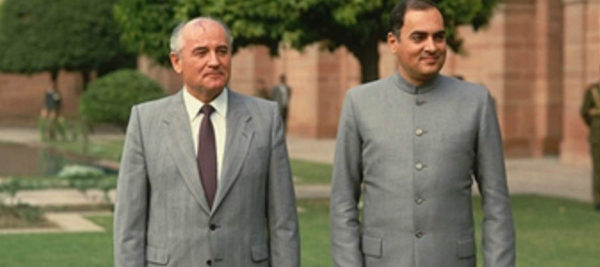BY SAEED NAQVI
The collapse of the Soviet Union 30 years ago was a tragedy for half the world but frothed with possibilities for the other half which the West spilt, mistaking rampaging markets for democracy.
My memory of events three decades ago is of a personal nature because I was the only journalist who interviewed Mikhail Gorbachev, the man who, on a high wire act of historic reforms, lost control. Foreign Secretary, Romesh Bhandari would not obstruct my interview but he promised the media accompanying Prime Minister, Rajiv Gandhi to Moscow that “they would all stand around an arena while I did the interview.”
The choreography dictated the set. A circular boxing arena was created, ropes et al, in which four chairs were placed. Two for Gorbachev and his interpreter, one for the interviewer, but the fourth? Since Romesh Bhandari did not wish to be unpopular with the media accompanying the PM by allowing one journalist to steal a scoop. He, therefore, awarded the third chair to a notional representative for the rest of the media. Who could this be but the inimitable Russi Karanjia, the colourful editor of Blitz.
What Romesh did not realize is exactly what Andrei Gromyko, USSR’s longest serving Foreign Minister who stayed on for Gorbachev’s first year in office, immediately did. He peeped into the hall where the “rope-ring” had been set up. After concluding his talks with Rajiv Gandhi, Gorbachev would walk towards this arena.
Imagine the scene. Two interviewers looking at two empty chairs in the ring, and thirty journalists, craning their necks into the arena, clearing their throats and waiting for Gorbachev to take his seat. Gromyko, the old fox, was not going to allow the new Secretary General of the CPSU, in his very first outing with the media, to be exposed to a free for all press conference, a “tamasha”. Gromyko called it off.
My disappointment could not be measured and, for that reason, I persisted. I returned to Moscow the next year to interview Gorbachev, but that is another story. Before I close the Gorbachev segment for this column, a word on what was Gorbachev’s eventual vision for Soviet Russia was? “Something like the Scandinavian welfare state.” This was before neo con excesses during the fleeting unipolar moment and a rushed Murdochization of the media had disfigured much of the world, including Scandinavia.
The second image is of South Block, Ministry of External Affairs split down the middle on the goings on in Moscow. Arundhati (Chuku) Ghosh, that heavy smoking, clean hearted Brahmo, Joint Secretary for Africa, is in a state of anxiety. She is following events in Moscow – the coup, a tense moment for her. She is not clear what she wants, but her DNA demands a “liberal” system, not the Soviet Union. To her it does not matter if Boris Yeltsin replaces Gorbachev.
Round the corner from Chuku, in his room at the far end of the corridor, Foreign Secretary, Muchkund Dubey, a homespun Bihari intellectual, culturally as distinct from Chuku as chalk is from cheez, is on the line to his Ambassador in Moscow, Alfred Gonsalves. The two are classical status quoists. Having spent a lifetime writing position papers mindful of the two blocs, the imminent collapse of the Soviet Union is, for them, like having to walk on one leg.
This brings me to the third question: was the Indian Establishment ever emotionally embedded with the Soviet Union?
On the one hand C. Rajeswara Rao, longest serving General Secretary of the CPI, is shaking with rage at a reporter who asked him if the Soviet Union was collapsing.
“Sir (loaded with satire), not a pin in this world moves without the Soviet Union being involved.”
This touching faith in the Soviet Union was all pervasive among progressive writers and Urdu poets carted to Mumbai by an earlier General Secretary of CPI, P.C. Joshi.
“Kremlin ke minar jaage hue kharey hain.”
(The minarets of Kremlin beckon us.)
This was Javed Akhar’s father Jaan Nisar Akhtar, ecstatic about the Kremlin minarets. A fine ghazal writer like Majrooh Sultanpuri could not resist the pressure of his peers.
“Meri nigah mein hai arze Moscow, Majrooh, Woh sarzameen ki sitarey jise salaam karein.”
(My eyes are set on Moscow, that blessed place where stars come down from heaven to shower their salutations.)
Poets, writers, painters, actors, film producers, college campuses, and coffee house regulars – a comprehensive segment, under the domain of Saraswati were largely, Left. Wealth was scoffed at. Gentlemen travelled by “tongas”; cars were for upstarts.
This entire lot was marginal to the pro west establishment, big industrialists whose “proximity” to Gandhiji gave them an all pervasive influence. Before V. Shankar, ICS, could join Deputy Prime Minister, Vallabh Bhai Patel’s office, he had to be interviewed by Ghanshyam Das Birla, leading industrialist in whose house Gandhiji died.
Marwari owned newspapers which Indira Gandhi dubbed the “Jute Press” never posted a correspondent to Moscow even in days when the Indian Ambassador had direct access to the Central Committee. Instead, correspondents were posted to London and Washington where they had no access. A much valued qualification for these correspondents was their ability to arrange for vegetarian food without onions or garlic preferably from their own kitchen for families of proprietors.
The only Indian journalist in Moscow was the towering figure of Masood Ali Khan, a pathan to boot, representing the CPI organ, New Age. He had phenomenal access to the otherwise impenetrable Soviet system. He was a mandatory fixture for all visiting Indian journalists, diplomats, progressive writers. When the Soviet Union collapsed Masood fell into abject penury. His salary which the Soviet system had arranged through the Red Cross was stopped. He died on the box-sofa of his one room tenement close to a metro station. Beneath the cushion on the sofa, were lined hundreds of 78 rpm records of western classical music he had collected during better days at the BBC in London.
(Saeed Naqvi is a senior Indian journalist, television commentator, interviewer, and a Distinguished Fellow at Observer Research Foundation. Mr. Naqvi is also a mentor and a guest blogger with Canary Trap)
Canary Trap is on Telegram. Click here to join CT’s Telegram channel and stay updated with insightful and in-depth content on Security, Intelligence, Politics, and Tech.

